SACO — Mike Kramer tugged on his padded white gloves as a chill wind blew behind Saco Middle School.
Perched on a portable chair next to a wooden-slatted snow fence, Kramer watched a quartet of grown men bundled in sweatpants and sweatshirts, grunting and sweating and swearing – at themselves and at each other – inside a 20-by-40-foot concrete handball court. Sneakers squeaked. A blue rubber ball echoed as it thwacked against three tall walls that have no ceiling. The thermometer read 51 degrees.
To be fair, the men are not just grown; they are old. Kramer, whose beard features more salt than pepper, took up handball at age 55. That was seven years ago.
“They called me Kid,” said Kramer, a psychologist from Portland, “which felt great.”
Handball is not a sport designed for old men. It demands vigor, quick reflexes, spry muscles and ambidexterity. The learning curve is steep and often painful, and fewer youngsters – at least those in Maine – are willing to make that climb.
All of which leaves the older men in a quandary: Can they find enough new players to keep their sport alive locally, or will it vanish when they fade from the scene?
No more than a dozen members of the United States Handball Association reside in Maine. Nationwide, there are about 7,000 members and an estimated 25,000 players in organized tournaments, said Vern Roberts, 61, the USHA executive director based in Tucson, Arizona.
“I know it’s older guys in Maine,” Roberts said. “But in New York City, it’s played in the public school athletic league and there’s 1,500 kids playing.”
Soon it was Kramer’s turn to jump into the fray, to join the men at play. Last week was possibly the last outdoor handball session of the year for the group, which plays two to three times a week. They will return to four-wall handball for the winter at nearby Saco Sport and Fitness until venturing outside again in April.
WORRIED SPORT WILL DISAPPEAR
The same core of a dozen men has repeated this cycle for the past decade, since one of them, a retired engineer from Saco named Jim Prendergast, led the drive to build the outdoor handball courts, the only such three-wall structure in northern New England.
Prendergast keeps detailed records of how often they play, and he also hosts the clambake at the annual state tournament in late July, when handball aficionados from seven states come to Maine to compete.
“One of the things we all worry about is that this sport is going to disappear,” Kramer said. “We also worry that, if we’re the only guys playing, will we even have enough guys to play?”
By “play,” Kramer means competitive play. Therapy is littered with clients with overly developed work ethics.
“People who really work at doing fun things – it could be outdoor adventure, it could be music, definitely sports – generally, it affects their mood in a positive way,” Kramer said. “I always recommend to my patients to do physically active things. For example, with depression, doing regular exercise actually makes a difference.”
Maintaining fitness as a person matures – a daily jog, for example – is one thing. Coming back from an eight-point deficit to win a doubles match against the guys who had been trash-talking you and your partner is on an entirely different plane.
ANCIENT GAME BROUGHT TO U.S.
Handball is an ancient game that traces its roots to Egyptians, Aztecs and Mayans. The Irish refined it by adding monastery walls to hit a ball against. Irish immigrants are credited with bringing the game to this country. During the California Gold Rush, the first court appeared behind a San Francisco saloon.
The rules are simple. Hit a ball on the fly against a front wall to your opponent, who must then return it to the front wall before it bounces twice. You can play singles or doubles. Rarely do the guys in Saco play anything but doubles.
“It’s not a sport that people even know about,” Kramer said. “When anybody comes out for the first time, physically it really hurts.”
Mis-hits lead to bone bruises and swollen hands. That’s why starting off with a softer racquetball is recommended for beginners. It’s also why handball numbers are so low.
FREEBIES TO FIND YOUNG PLAYERS
Membership in the USHA peaked at about 10,000 in the early 1990s, said Roberts, the executive director. The game remains popular on the West Coast and in New York City. The recent U.S. Open tournament in Fountain Valley, California, featured 350 players competing in one-wall, three-wall and four-wall brackets.
In an effort to find new blood, the USHA offers free gloves, balls and eye guards to physical education teachers willing to teach handball.
Roberts said bilateral brain development is an added bonus of the sport.
“When you use both sides of the body, it exercises both sides of the brain, and those kids do better in the classroom,” he said. “Not to mention that it will help you in just about every other sport you play.”
Roberts said handball is being taught, in some manner, in schools in all 50 states.
“Obviously, with (budgets) being cut back everywhere,” he said, “we’ve got a lot of teachers taking us up on our offer.”
Thing is, once you get over that initial hump, handball can be addicting. There may not be another sport that offers an equivalent workout, one that so requires and rewards ambidexterity. There are no backhand shots in handball. You must use your left and your right.
“There’s no replacement for hitting a ball with your hand with no utensils,” said Roberts. “It’s not an easy game, but once you learn how to play handball, you don’t want to give it up. If you get the bug, there’s no replacing it.”
Tom Adams, a 70-year-old retired civil engineer, caught the bug 50 years ago in college in Ohio. He said most players he knows learned either in college or the military. Occasionally, he’ll run across someone who learned handball in prison.
Adams lives on Chebeague Island. On Sunday mornings he plays piano at the Methodist Church, eases into a kayak to paddle to Cousins Island to get his car, then drives 30 miles to Saco in order to play handball.
“What I love,” he said, “is the charge you get when you hit a shot perfectly.”
Baseball and golf have the sweet spot with bat and driver, Adams said. Handball is even sweeter, he said, because there’s nothing between you and a perfectly struck ball.
“And there are more of them,” he said. “Of course, there’s more mistakes, too. It’s like playing shortstop, but instead of getting to touch the ball 10 or 20 times during two hours, you get to touch the ball a couple hundred times. And out of those, you’ll get a few that just give you a charge.”
RACQUETBALL WITHOUT THE RACKET
“It’s a unique sport,” said Steve Jack, 65, a retired schoolteacher from Portland who now lives in Windham and took up the game more than 40 years ago. “Not many people play. I guess there’s some appeal there. You tell people you play handball and they say, ‘What? What’s that? How do you play that?’ I say it’s just racquetball without the racket.”
Overhearing this, Bill Kennedy interjected.
“Handball has been played forever and racquetball just started in the 1970s,” Kennedy said, “so you can’t give racquetball any kind of credit for us.”
Now 75, Kennedy grew up in New Jersey and learned the game from a buddy who played football for Boston College, where the coach required his linemen to play handball in the offseason to improve their balance and coordination.
“I was 25 years old and went on the court for the first time and he beat me,” said Kennedy, who moved to Otisfield in 2008 after renovating a lakeside camp into a year-round home. “And it (set) me off because I was a better athlete than an offensive … lineman. So I started playing. You set a plateau for yourself. You get there. Then you move up another notch.”
POSSIBLE HOPE FOR THE FUTURE
When Kennedy started playing handball in 1965, the YMCA in Montclair, New Jersey, featured two courts and 150 to 200 players. Tournaments were held with four flights – A, B, C and D.
“Now if you go to that YMCA, you’ll be lucky to find anybody playing handball,” Kennedy said. “The courts are still there. This sport is really dying in this part of the country. It’s sad.”
The Portland YMCA was home to handballers until a few years ago, when squash players effectively squeezed them out, leaving the Bath YMCA as the only other winter venue besides Saco.
“It was all done very quietly,” said Larry Morse, 60, of Cumberland. “Four or five years ago they converted the courts.”
Still, hope for the future may be close at hand. George Sherry teaches physical education at Saco Middle School. He took notice of the old guys when he was teaching a tennis unit nearby and they invited him to give it a whirl.
A former soccer player at the University of Maine, Sherry quickly picked up the basics of handball. Prendergast arranged for a USHA instructor to fly in from California to give a clinic.
“He came here and taught all our classes for four days,” Sherry, 42, said of Gary Cruz, the USHA youth development coordinator. “He gave us a lot of ideas on what we should do.”
Since that visit five years ago, Sherry has incorporated a handball unit that lasts five to eight days. He teaches it in the fall and spring, first demonstrating throwing technique with each hand, then lining up students to hit on the move. Sixth-graders have trouble, but seventh- and eighth-graders can become proficient enough to play actual games.
“You have to use both sides of your body,” Sherry said. “That’s the major thing I like about it, because a lot of kids don’t concentrate much on their weak or non-dominant side. When they go with their non-dominant side, they really have to think about the technique.”
SPORT TO ENJOY FOR A LIFETIME
The other aspect that appeals to Sherry is the lifetime nature of the sport. The kids can see that for themselves on Wednesday and Friday afternoons in late spring and early fall.
“You don’t need a lot of equipment,” he said. “Basically, all you need is a ball and a wall and you can play against it.”
Another youth program flourished in Rockland for several years before petering out. Perhaps some of those seeds will eventually bear fruit. As it is, with the exception of Sherry, the only players not eligible for AARP who show up in Saco are sons of the core group, home for summer visits.
“When this group goes,” Kennedy said, “I just don’t see any handball in the state of Maine.”
Soon, as early as this week, this group is headed indoors. Until then, they’ll hang on to their time in the sun for just as long as they can.
Send questions/comments to the editors.


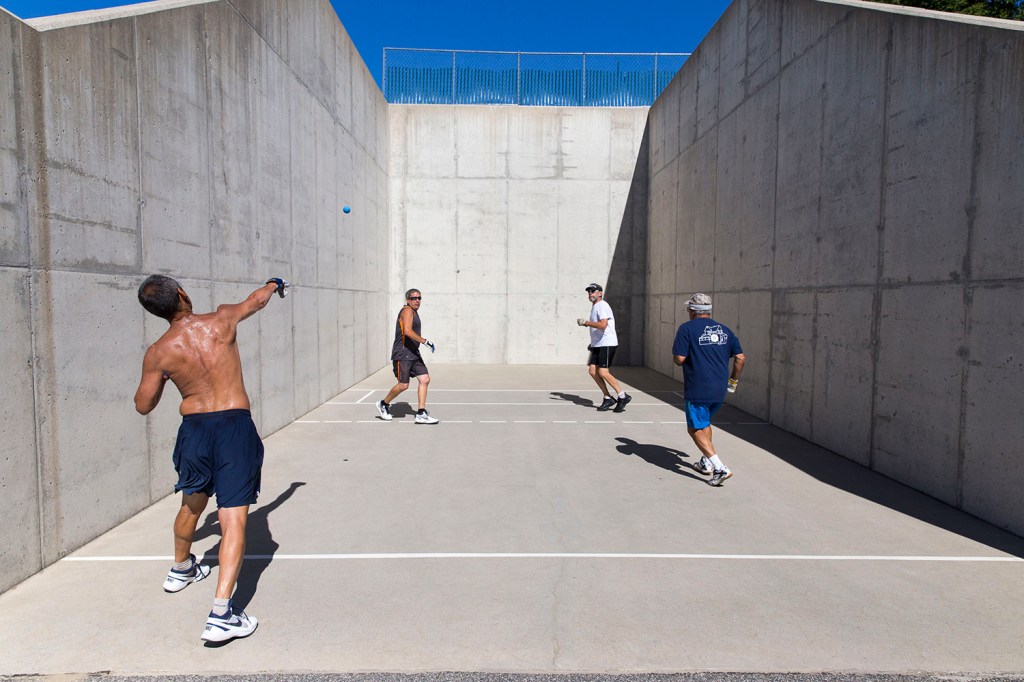
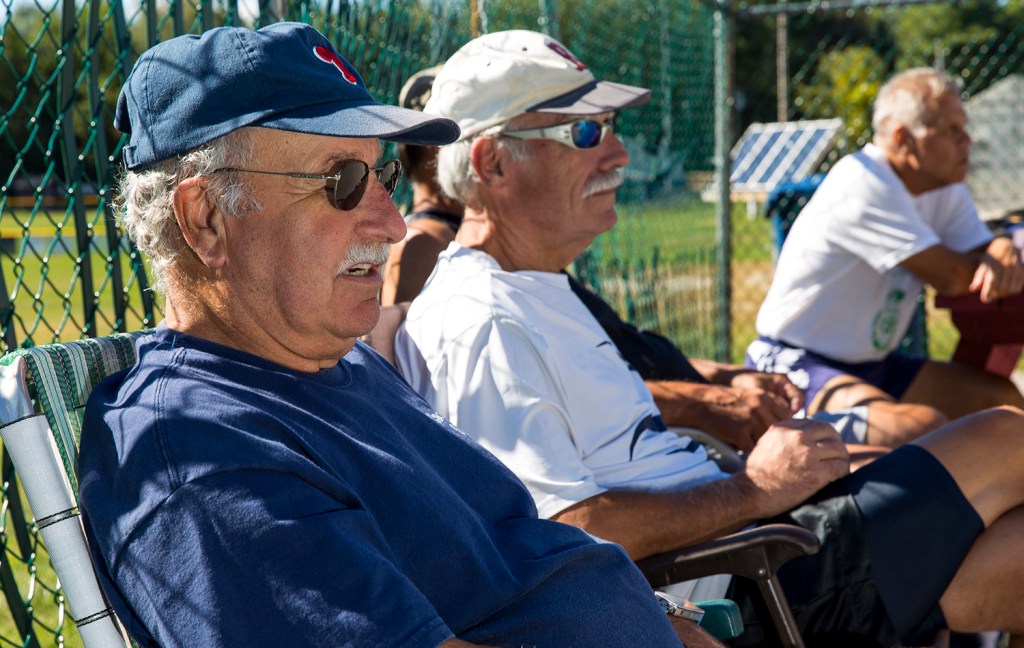
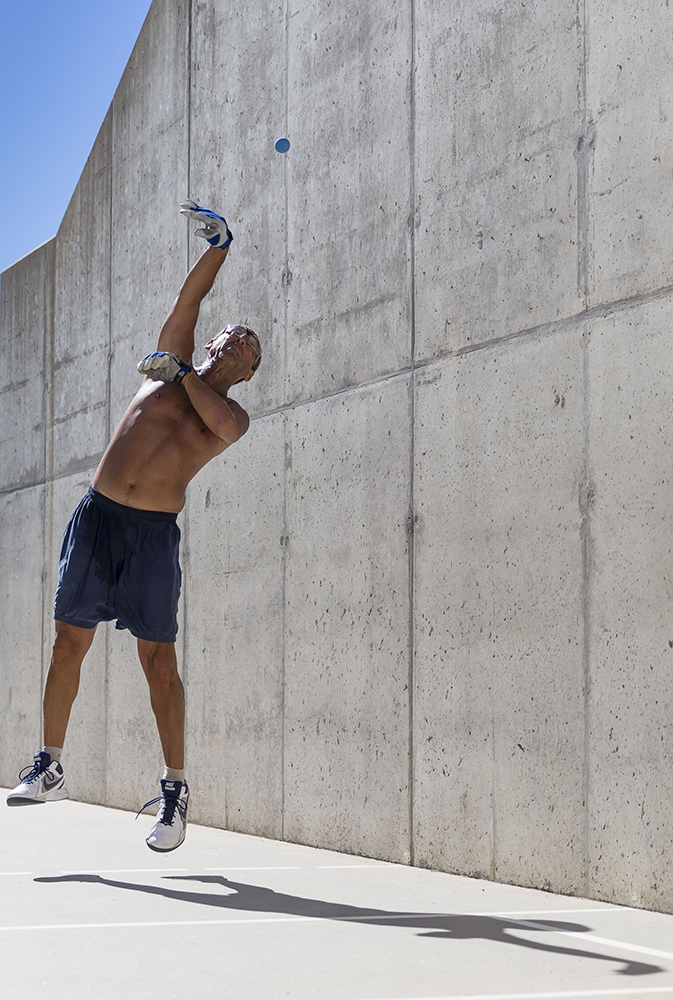
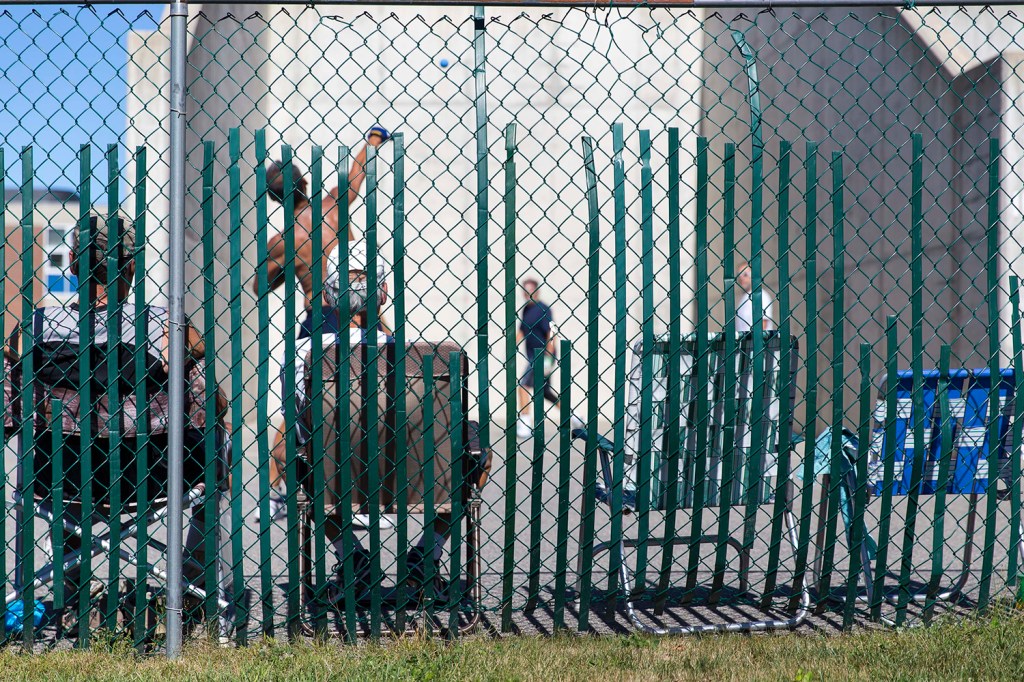
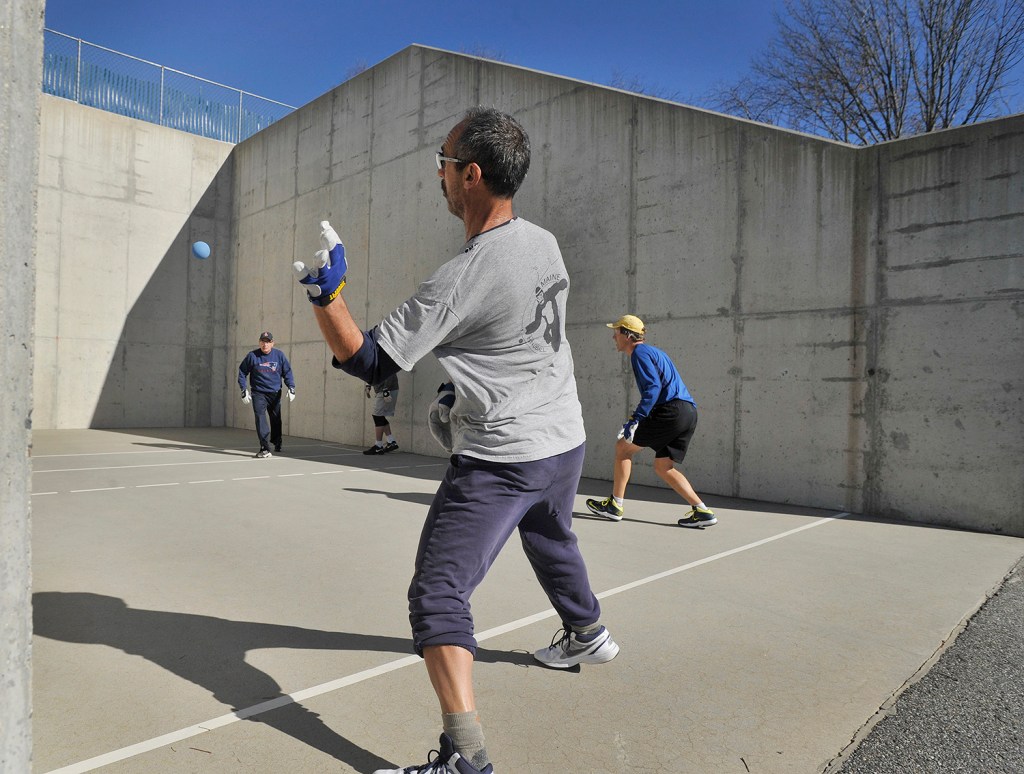
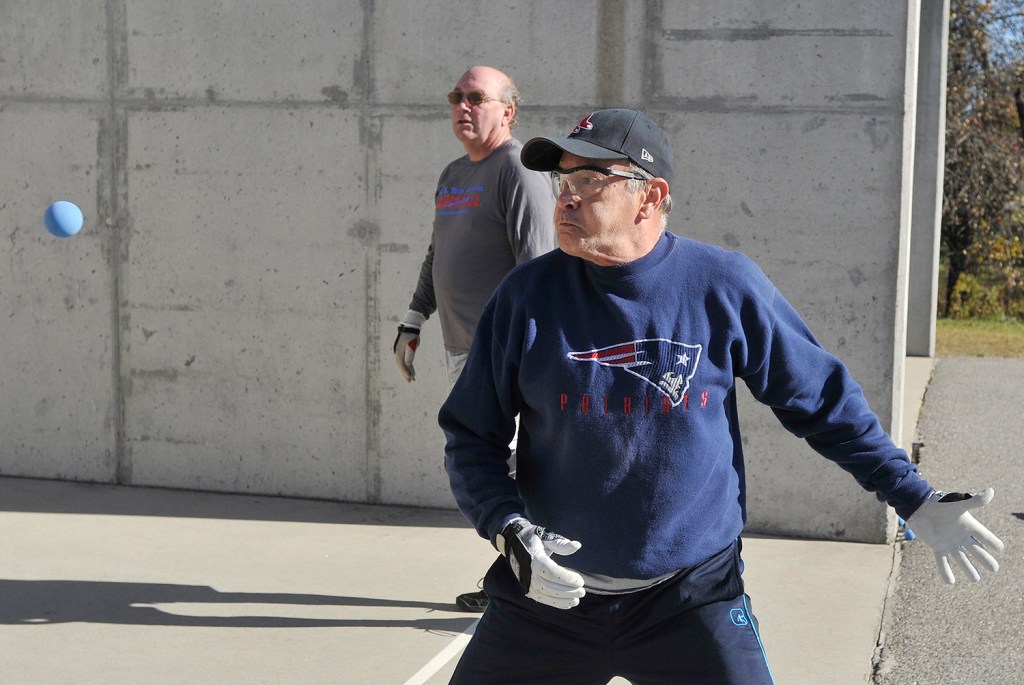
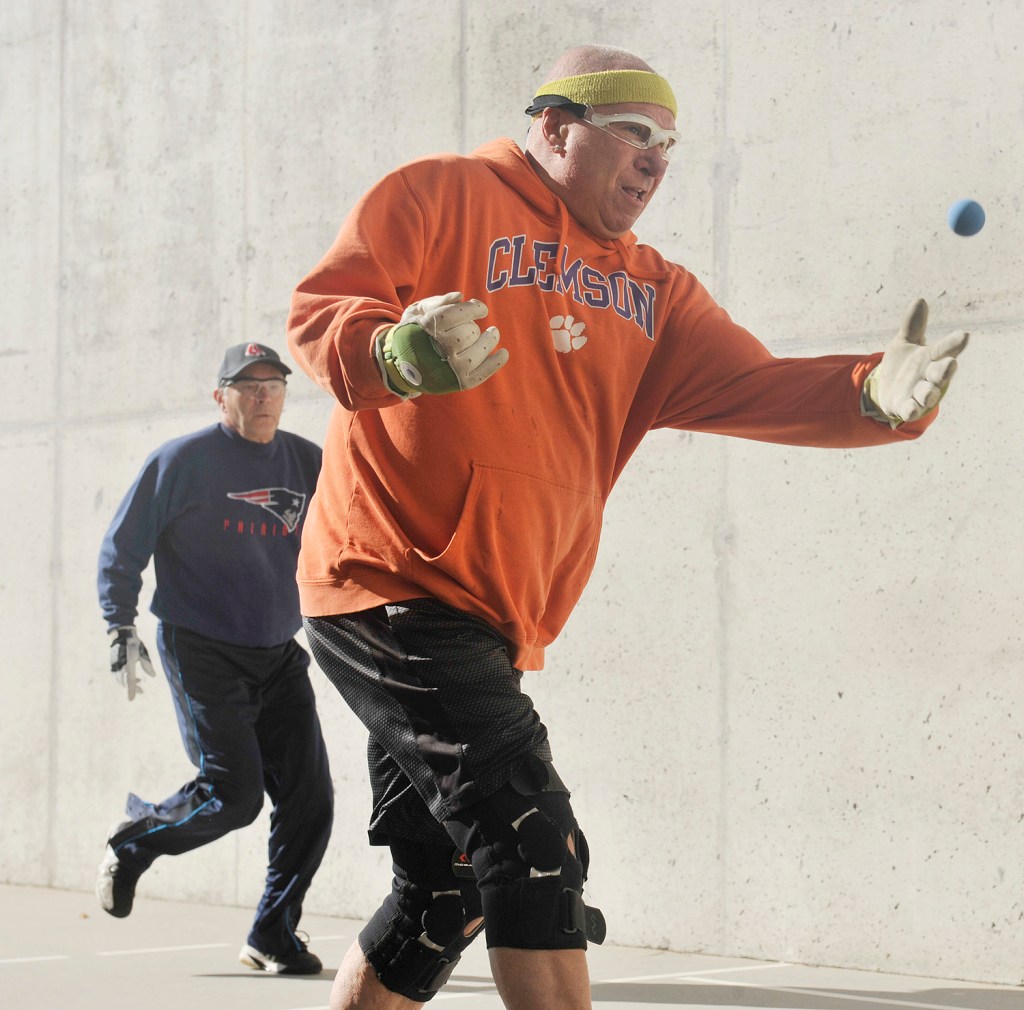
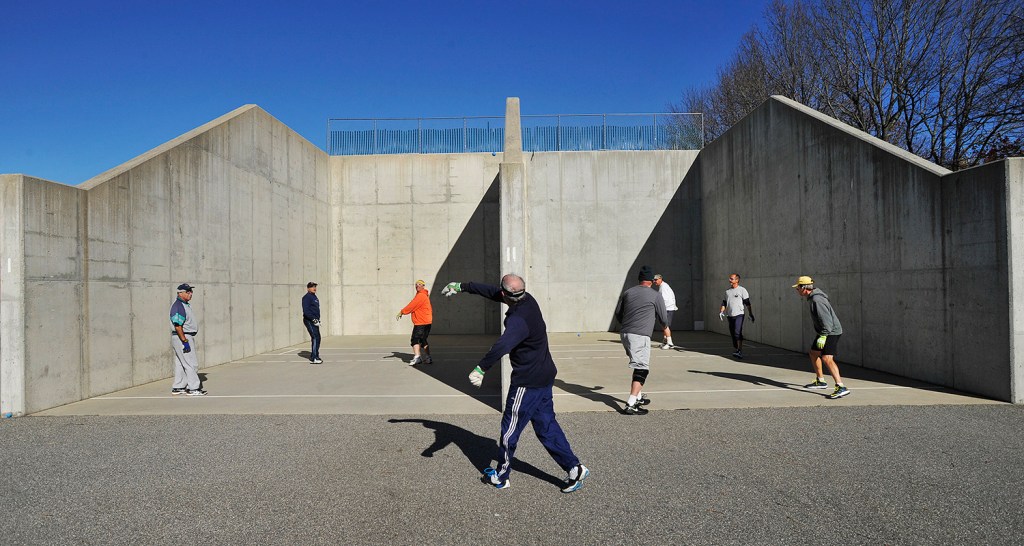

Success. Please wait for the page to reload. If the page does not reload within 5 seconds, please refresh the page.
Enter your email and password to access comments.
Hi, to comment on stories you must . This profile is in addition to your subscription and website login.
Already have a commenting profile? .
Invalid username/password.
Please check your email to confirm and complete your registration.
Only subscribers are eligible to post comments. Please subscribe or login first for digital access. Here’s why.
Use the form below to reset your password. When you've submitted your account email, we will send an email with a reset code.